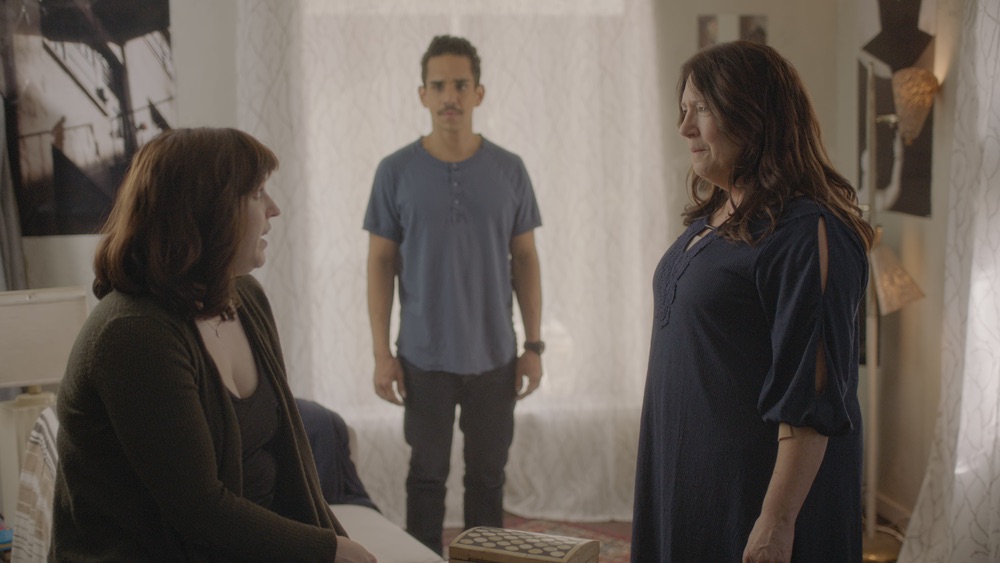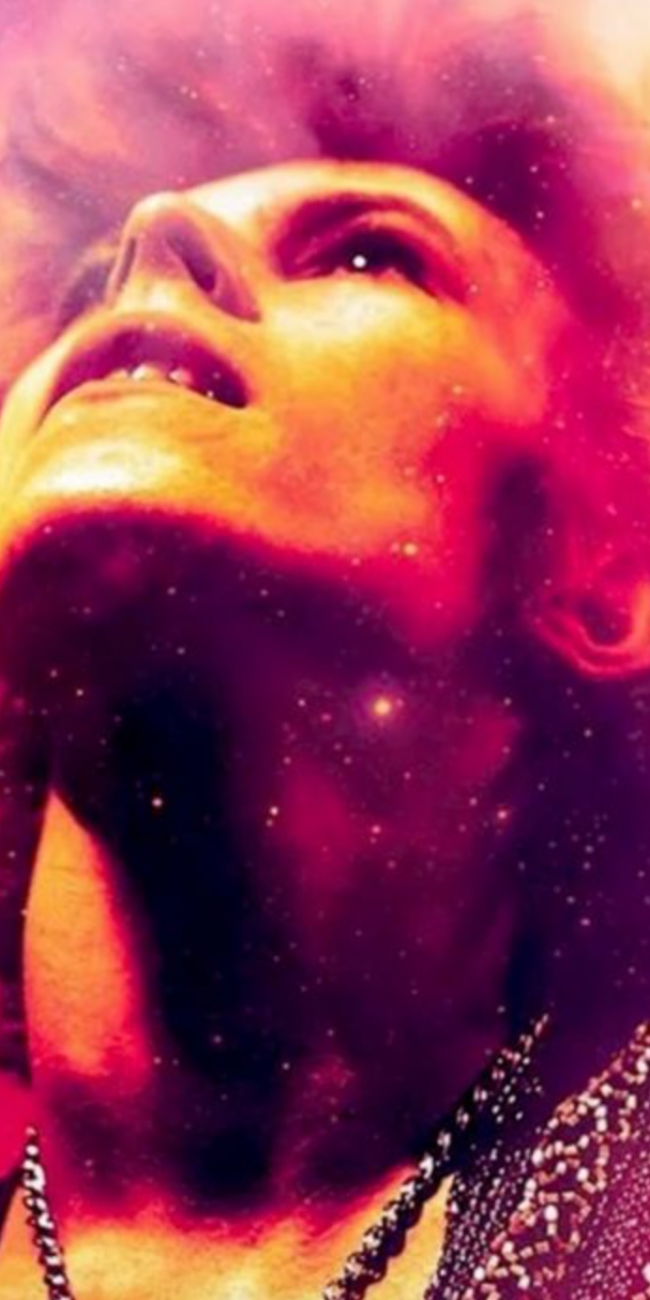SPEED OF LIFE

(Liz Manishil’s Speed of Life released on all digital platforms on Friday, January 10. Like what you see here on Hammer to Nail? Why not pay just $1.00 per month via Patreon to help keep us going?)
Publicly mourning a celebrity death has become one of the great modern pastimes. But we all have our big losses – the ones that define us. When you were younger, it felt like they understand you like no one in your physical proximity. You’ll always remember where you were when you heard the news. You don’t know them, but their existence was formative and so their loss is palpable.
David Bowie was one of those artists for me. And apparently, I wasn’t the only one who felt like the world broke when he died. Liz Manashil (Bread and Butter) wrote and directed Speed of Life, a sci-fi-ish existential character dramedy based on the premise that when David Bowie died on January 10th, 2016, it ripped a hole in spacetime that directly impacted the life of her protagonist, June (played by Allison Tolman and Ann Dowd).
The film briefly introduces us to June as a tween in 1992, as she draws an Aladdin Sane lightning bolt on her face in the mirror. It speaks volumes to who she is. Anyone willing to do something so bold to their face is operating on society’s fringes. Clearly, she identifies with Bowie on an atomic level. 24 years later, June is a full-grown woman, living in a house that she inherited – possibly even her childhood home. If that’s the case, then it’s the same space in which she first felt seen by the Thin White Duke.
Perhaps that’s why, during a relationship-defining argument with her boyfriend, Edward (Ray Santiago, Ash Vs. The Evil Dead), a wormhole opens up in the living room. June (Tolman, TVs Fargo) has just learned of Bowie’s death. Edward is blasé about it, but June is devastated. She can’t articulate why she’s upset but the fact that Edward can only make jokes prompts her to read from a literal list of relationship issues she’s been keeping in a desk drawer. Before they know it, they’re in a fight. How can she be sure he truly loves her if he can’t take her seriously? She needs him to make a grand gesture to prove his loyalty. He doesn’t know what she means. She says she can’t tell him what to do, lest it diminish the sincerity of the act. The fight has reached a fever pitch. June slumps into a chair, sobbing. Edward apologetically approaches her, and then vanishes in a flash. June sees him disappear but she can hardly believe her eyes. She wanders around the space, bewildered and panicked, calling Edward’s name.
Smash cut to pitch-perfect character actress Ann Dowd (The Leftovers, The Handmaids Tale), playing June just shy of her 60th birthday. The year is 2040, and 24 more years have elapsed. We’re introduced gradually to this Spike Jonez-esque dystopia. Alexa-ish lifestyle assistants are installed in every room of June’s house, telling her to stretch, watch her PH levels and double her calcium intake. It also reminds her that it’s almost her birthday and she has yet to fill out her legally mandated “retirement” application. June spends her time watching her bird bath and TV with her neighbor and sort-of boyfriend, Sam (Jeff Perry, Scandal).
Eventually, we learn that in 2040, 60-year-olds are forced to relocate to a government facility where they will receive full care for the rest of their days, but are never again allowed to roam free in society or even associate with anyone under retirement age. June doesn’t believe in “The Program,: but the main reason she is reluctant to ship herself off to a nice farm upstate is because she feels that Edward might return at any moment. She’s thought about him every day since he disappeared. The world gave him up for dead, but because of “the way he disappeared”, she has held out hope for his return all this time.
And then he does. He doesn’t recognize her at first, and he’s in a state of shock. To him, it’s been but a moment and he hasn’t aged at all. He simply fell forward in his own living room and, when he stood up, the furniture was different and there was an older woman staring at him. But then June provides him with a quick digital information dump and he had a general understanding of what happened. He fell through time and space for her, which is about as grand as gestures get. But in the meantime, June’s life stalled. In 2016, she lost two great loves (Edward and Bowie), and she never recovered. She can’t truly move forward until she works some shit out.
Edward is stalled too. He’s lost in this future. Santiago absolutely kills in one of the most wrenching scenes in the film. He sits alone on a park bench and has a one-sided phone conversation with his sister. He decides to pretend to be a “friend of Edward’s” to gets the scoop on what he’s missed. And what he missed is a lifetime. He’s overcome with emotion as he realizes that he’s still stuck in the void. And June might not be able to wait for him any longer.
Vella Lovell (Crazy Ex-Girlfriend) is also terrific in a subplot as Sam’s daughter, Laura. “The Program” isn’t awesome for younger people either. Most employment has become obsolete thanks to technology (you might say Homo Sapiens have outgrown their use) leaving the youth broke and listless. She flirts with her new neighbor and contemplates her present and future, since her dad is about to turn 60 as well.
The one thing holding this film back is the absence of Bowie. Clearly, the music and likeness licensing were cost-prohibitive. The film artfully sticks to the budget with clever exposition, explaining this techno-dystopia without having to show any of it. But it’s a true shame they couldn’t incorporate the actual art of the film’s muse.
I get why it had to be this way. A stand-in wouldn’t have been as meaningful, and might have even seemed satirical instead of transcendental. But Liz Manashil manages to deliver a very effective story within her significant limitations. It speaks to her talents that she can make something so resonant whilst being forced to dance around the emotional core of the film.
Her cast brings it all home with their candid performances. Dowd and Tolman are seamless as their counterparts. When June looks at Edward, it’s with the same eyes, whether she’s 35 or 59 and ¾. There’s a Harold and Maude vibe for a while. Santiago and Dowd have terrific chemistry. That’s Santiago’s best magic trick – transferring that same flirty energy from Tolman to Dowd. Imagine how much better it could be if music royalties weren’t so exorbitant. Please see this film and tell your friends so that next time, Manashil can fire on all cylinders and really blow us away.
Like what you see here on Hammer to Nail? Why not pay just $1.00 per month via Patreon to help keep us going?
– Jessica Baxter (@tehBaxter)











